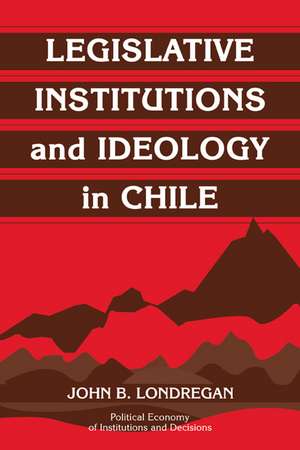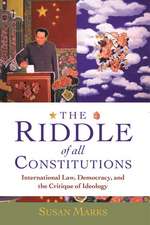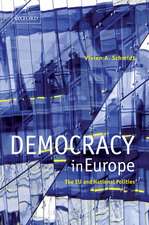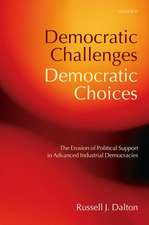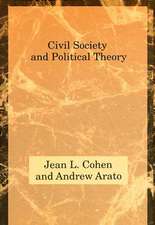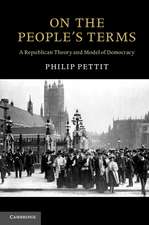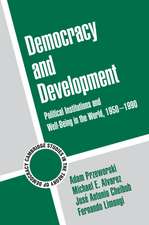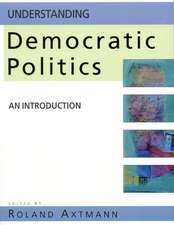Legislative Institutions and Ideology in Chile: Political Economy of Institutions and Decisions
Autor John B. Londreganen Limba Engleză Paperback – 16 mai 2007
| Toate formatele și edițiile | Preț | Express |
|---|---|---|
| Paperback (1) | 286.89 lei 6-8 săpt. | |
| Cambridge University Press – 16 mai 2007 | 286.89 lei 6-8 săpt. | |
| Hardback (1) | 644.34 lei 6-8 săpt. | |
| Cambridge University Press – 30 iul 2000 | 644.34 lei 6-8 săpt. |
Din seria Political Economy of Institutions and Decisions
-
 Preț: 133.60 lei
Preț: 133.60 lei -
 Preț: 208.93 lei
Preț: 208.93 lei -
 Preț: 235.99 lei
Preț: 235.99 lei -
 Preț: 200.85 lei
Preț: 200.85 lei -
 Preț: 211.84 lei
Preț: 211.84 lei -
 Preț: 231.82 lei
Preț: 231.82 lei -
 Preț: 306.68 lei
Preț: 306.68 lei -
 Preț: 208.14 lei
Preț: 208.14 lei -
 Preț: 177.53 lei
Preț: 177.53 lei -
 Preț: 295.55 lei
Preț: 295.55 lei -
 Preț: 236.43 lei
Preț: 236.43 lei -
 Preț: 265.11 lei
Preț: 265.11 lei -
 Preț: 228.38 lei
Preț: 228.38 lei -
 Preț: 281.49 lei
Preț: 281.49 lei -
 Preț: 285.37 lei
Preț: 285.37 lei -
 Preț: 279.98 lei
Preț: 279.98 lei - 14%
 Preț: 773.75 lei
Preț: 773.75 lei -
 Preț: 233.38 lei
Preț: 233.38 lei -
 Preț: 247.41 lei
Preț: 247.41 lei -
 Preț: 203.12 lei
Preț: 203.12 lei -
 Preț: 230.33 lei
Preț: 230.33 lei -
 Preț: 286.69 lei
Preț: 286.69 lei - 14%
 Preț: 790.57 lei
Preț: 790.57 lei -
 Preț: 265.32 lei
Preț: 265.32 lei - 11%
 Preț: 554.15 lei
Preț: 554.15 lei -
 Preț: 287.07 lei
Preț: 287.07 lei - 11%
 Preț: 700.20 lei
Preț: 700.20 lei -
 Preț: 273.13 lei
Preț: 273.13 lei -
 Preț: 459.84 lei
Preț: 459.84 lei -
 Preț: 280.35 lei
Preț: 280.35 lei -
 Preț: 260.11 lei
Preț: 260.11 lei - 11%
 Preț: 640.30 lei
Preț: 640.30 lei -
 Preț: 247.80 lei
Preț: 247.80 lei - 11%
 Preț: 691.81 lei
Preț: 691.81 lei -
 Preț: 287.48 lei
Preț: 287.48 lei - 11%
 Preț: 641.80 lei
Preț: 641.80 lei - 11%
 Preț: 635.32 lei
Preț: 635.32 lei -
 Preț: 271.01 lei
Preț: 271.01 lei -
 Preț: 265.70 lei
Preț: 265.70 lei
Preț: 286.89 lei
Nou
Puncte Express: 430
Preț estimativ în valută:
54.90€ • 57.20$ • 45.45£
54.90€ • 57.20$ • 45.45£
Carte tipărită la comandă
Livrare economică 03-17 aprilie
Preluare comenzi: 021 569.72.76
Specificații
ISBN-13: 9780521037266
ISBN-10: 0521037263
Pagini: 292
Ilustrații: 24 b/w illus. 14 tables
Dimensiuni: 154 x 229 x 17 mm
Greutate: 0.43 kg
Editura: Cambridge University Press
Colecția Cambridge University Press
Seria Political Economy of Institutions and Decisions
Locul publicării:New York, United States
ISBN-10: 0521037263
Pagini: 292
Ilustrații: 24 b/w illus. 14 tables
Dimensiuni: 154 x 229 x 17 mm
Greutate: 0.43 kg
Editura: Cambridge University Press
Colecția Cambridge University Press
Seria Political Economy of Institutions and Decisions
Locul publicării:New York, United States
Cuprins
Acknowledgements; Introduction; 1. Ideology and valence; 2. Accident and force; 3. Legislative institutions in the constitution of 1980; 4. Roll-call votes and senate committees; 5. The Labor committee; 6. The Education committee; 7. The Constitution committee; 8. Legislative politics and Chile's transition toward democracy; Conclusion; Appendix: estimating preferences from voting records; Bibliography; Index.
Recenzii
'Londregan's book poses a powerful question: to what extent does a quasi-democratic constitution crafted by a military government constrain a liberal electorate from enacting laws consistent with their preferences? In answering this question, Londregan combines state-of-the-art methodology with a deep understanding of the Chilean case. The scintillating analysis of legislative politics in the final chapter is proof positive that high-tech statistical methods are a tool, not a barrier, to compelling narrative. I recommend this book to all comparativists.' David Latin, Stanford University
'Londregan's study is pathbreaking in an astonishing number of ways. In the course of demonstrating that Chile's dictatorship established subtle constraints that continue to impinge on the legislative process in democratic Chile, he carries off conceptual and methodological innovations that will shape the way we study legislatures and presidents around the globe. Any remaining barrier between comparative politics, American politics and methodology are shattered by this remarkable study.' Susan Stokes, University of Chicago
'Londregan's study is pathbreaking in an astonishing number of ways. In the course of demonstrating that Chile's dictatorship established subtle constraints that continue to impinge on the legislative process in democratic Chile, he carries off conceptual and methodological innovations that will shape the way we study legislatures and presidents around the globe. Any remaining barrier between comparative politics, American politics and methodology are shattered by this remarkable study.' Susan Stokes, University of Chicago
Descriere
This book uses Chile to explore guarantees to authoritarian governments voluntarily ceding power to democratic successors.
